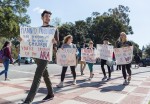A nationwide political movement reached UCLA when students protested the lack of comprehensive gun control laws on campus Thursday afternoon.
About 20 students gathered at Janss Steps to march around Royce Quad, chanting “Hey ho, hey ho, the NRA must go.” Sydney Sacker, a fourth-year communication student, said she organized the walkout on Facebook after being moved by Stoneman Douglas High School students advocating for gun control in Washington, D.C. and on social media following a mass shooting at their high school two weeks ago.
“When I heard about Florida as another mass shooting, (I thought) ‘What is going on behind the doors of congressmen and congresswomen who are supposed to be representing constituents and protecting them?’”
She added she thinks university students should also participate in gun control advocacy efforts.
“We have the flexibility to leave class in a way that most high school students can’t, because we don’t have the same limitations and rules that high school students do,” she said.
Victoria Solkovits, second-year political science and human biology and society student and a California democratic delegate, said she thinks the federal government should understand it is not doing enough to solve the problem of mass shootings.
“I think we’ve been seeing a national response from students for gun control saying enough is enough, and our government isn’t doing enough to pass comprehensive gun control,” Solkovits said.
However, Louis Madrid, a third-year history student who yelled at protesters, said that he thinks gun control makes citizens defenseless against the government.
“Totalitarian regimes push for gun control because it increases their dictatorial powers,” Madrid said. “The very same people who want gun control are the ones who call (President Donald) Trump a fascist. It just doesn’t make sense why they would want to disarm themselves.”
UCLA has joined other universities in announcing that disciplinary actions related to gun control protests will not affect high school students’ chances of admission.
Pedro Noguera, a professor of education at the UCLA Graduate School of Education and Information Studies, said he thinks the university’s response was appropriate because many students are passionate about gun control.
“I think civil disobedience involves sacrifice. People who were arrested protesting for civil rights in the ‘60s never asked for it not to be held against them,” he said. “But at the same time, any university that would hold a protest for gun control against a student is probably a university that student wouldn’t want to go to.”
Noguera added he thinks national response to the shooting in Parkland, Florida, showed mass shootings will not become normalized in the United States
“What’s happened shouldn’t be accepted as normal,” he said. “Mass shootings at concerts, movie theaters and schools have been seen as normal which is a problem, and it’s good to see people not standing for it,” Noguera said.
Eugene Volokh, a professor at the UCLA School of Law who specializes in gun law, said he thinks one reason the U.S. has not successfully passed gun control legislation is that supporters of gun rights are generally more determined in their support than supporters of gun control.
“Gun rights advocates are an organized, determined majority, and politicians feel they’ll take their feelings to the ballot box more strongly than gun control advocates will,” Volokh said. “Gun rights have narrow support, but it runs deep, while gun control has broad support that tends to be very shallow.”
Volokh added he thinks banning assault-style semi-automatic weapons, which many gun control activists are advocating for, would not necessarily help prevent mass shootings.
“Assault-style semi-automatics are very deadly, but it’s not clear that banning them would affect anything,” he said. “A determined shooter could kill about as many people with regular semi-automatics, and there are a lot of those that aren’t assault-style that wouldn’t be banned.”
